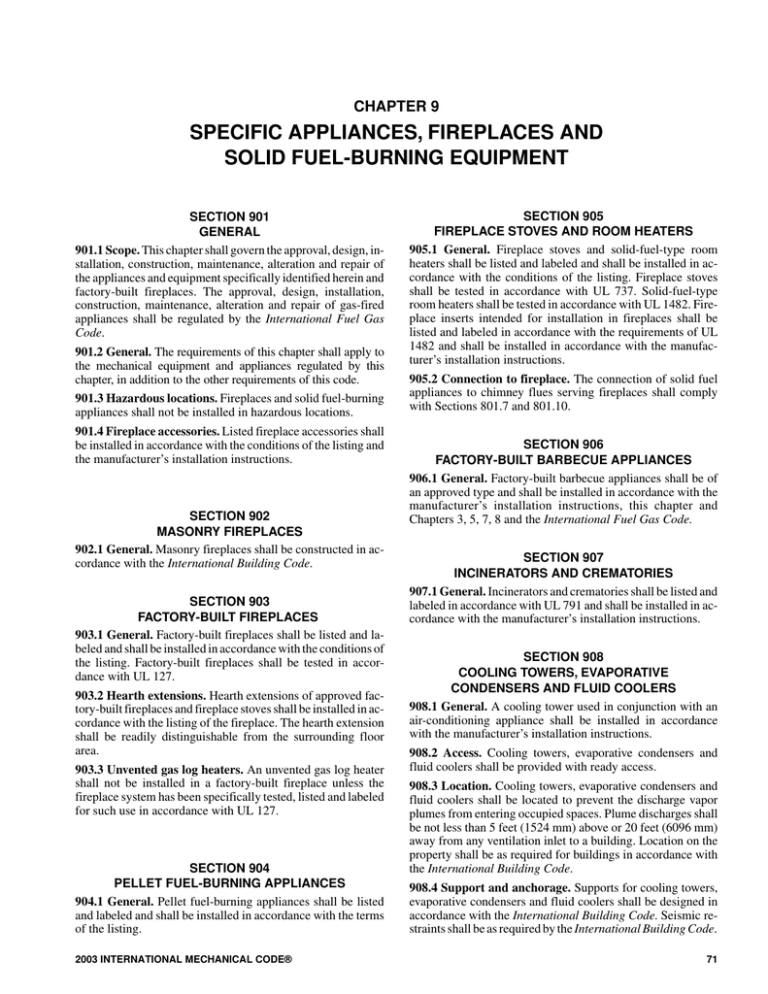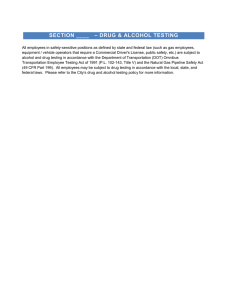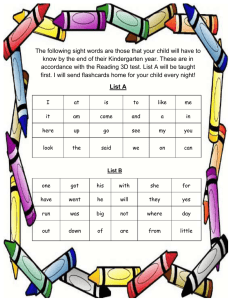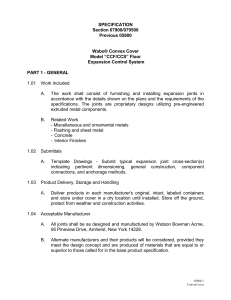chapter 9 specific appliances, fireplaces and
advertisement

CHAPTER 9 SPECIFIC APPLIANCES, FIREPLACES AND SOLID FUEL-BURNING EQUIPMENT SECTION 901 GENERAL 901.1 Scope. This chapter shall govern the approval, design, installation, construction, maintenance, alteration and repair of the appliances and equipment specifically identified herein and factory-built fireplaces. The approval, design, installation, construction, maintenance, alteration and repair of gas-fired appliances shall be regulated by the International Fuel Gas Code. 901.2 General. The requirements of this chapter shall apply to the mechanical equipment and appliances regulated by this chapter, in addition to the other requirements of this code. 901.3 Hazardous locations. Fireplaces and solid fuel-burning appliances shall not be installed in hazardous locations. 901.4 Fireplace accessories. Listed fireplace accessories shall be installed in accordance with the conditions of the listing and the manufacturer’s installation instructions. SECTION 902 MASONRY FIREPLACES 902.1 General. Masonry fireplaces shall be constructed in accordance with the International Building Code. SECTION 903 FACTORY-BUILT FIREPLACES 903.1 General. Factory-built fireplaces shall be listed and labeled and shall be installed in accordance with the conditions of the listing. Factory-built fireplaces shall be tested in accordance with UL 127. 903.2 Hearth extensions. Hearth extensions of approved factory-built fireplaces and fireplace stoves shall be installed in accordance with the listing of the fireplace. The hearth extension shall be readily distinguishable from the surrounding floor area. 903.3 Unvented gas log heaters. An unvented gas log heater shall not be installed in a factory-built fireplace unless the fireplace system has been specifically tested, listed and labeled for such use in accordance with UL 127. SECTION 904 PELLET FUEL-BURNING APPLIANCES 904.1 General. Pellet fuel-burning appliances shall be listed and labeled and shall be installed in accordance with the terms of the listing. 2003 INTERNATIONAL MECHANICAL CODE® SECTION 905 FIREPLACE STOVES AND ROOM HEATERS 905.1 General. Fireplace stoves and solid-fuel-type room heaters shall be listed and labeled and shall be installed in accordance with the conditions of the listing. Fireplace stoves shall be tested in accordance with UL 737. Solid-fuel-type room heaters shall be tested in accordance with UL 1482. Fireplace inserts intended for installation in fireplaces shall be listed and labeled in accordance with the requirements of UL 1482 and shall be installed in accordance with the manufacturer’s installation instructions. 905.2 Connection to fireplace. The connection of solid fuel appliances to chimney flues serving fireplaces shall comply with Sections 801.7 and 801.10. SECTION 906 FACTORY-BUILT BARBECUE APPLIANCES 906.1 General. Factory-built barbecue appliances shall be of an approved type and shall be installed in accordance with the manufacturer’s installation instructions, this chapter and Chapters 3, 5, 7, 8 and the International Fuel Gas Code. SECTION 907 INCINERATORS AND CREMATORIES 907.1 General. Incinerators and crematories shall be listed and labeled in accordance with UL 791 and shall be installed in accordance with the manufacturer’s installation instructions. SECTION 908 COOLING TOWERS, EVAPORATIVE CONDENSERS AND FLUID COOLERS 908.1 General. A cooling tower used in conjunction with an air-conditioning appliance shall be installed in accordance with the manufacturer’s installation instructions. 908.2 Access. Cooling towers, evaporative condensers and fluid coolers shall be provided with ready access. 908.3 Location. Cooling towers, evaporative condensers and fluid coolers shall be located to prevent the discharge vapor plumes from entering occupied spaces. Plume discharges shall be not less than 5 feet (1524 mm) above or 20 feet (6096 mm) away from any ventilation inlet to a building. Location on the property shall be as required for buildings in accordance with the International Building Code. 908.4 Support and anchorage. Supports for cooling towers, evaporative condensers and fluid coolers shall be designed in accordance with the International Building Code. Seismic restraints shall be as required by the International Building Code. 71 SPECIFIC APPLIANCES, FIREPLACES AND SOLID FUEL-BURNING EQUIPMENT 908.5 Water supply. Water supplies and protection shall be as required by the International Plumbing Code. wall, and wall register models shall not be placed closer than 6 inches (152 mm) to a corner. 908.6 Drainage. Drains, overflows and blowdown provisions shall be indirectly connected to an approved disposal location. Discharge of chemical waste shall be approved by the appropriate regulatory authority. The furnace shall be placed such that a drapery or similar combustible object will not be nearer than 12 inches (305 mm) to any portion of the register of the furnace. Floor furnaces shall not be installed in concrete floor construction built on grade. The controlling thermostat for a floor furnace shall be located within the same room or space as the floor furnace or shall be located in an adjacent room or space that is permanently open to the room or space containing the floor furnace. 908.7 Refrigerants and hazardous fluids. Heat exchange equipment that contains a refrigerant and that is part of a closed refrigeration system shall comply with Chapter 11. Heat exhange equipment containing heat transfer fluids which are flammable, combustible or hazardous shall comply with the International Fire Code. SECTION 909 VENTED WALL FURNACES 909.1 General. Vented wall furnaces shall be installed in accordance with their listing and the manufacturer’s installation instructions. Oil-fired furnaces shall be tested in accordance with UL 730. 909.2 Location. Vented wall furnaces shall be located so as not to cause a fire hazard to walls, floors, combustible furnishings or doors. Vented wall furnaces installed between bathrooms and adjoining rooms shall not circulate air from bathrooms to other parts of the building. 909.3 Door swing. Vented wall furnaces shall be located so that a door cannot swing within 12 inches (305 mm) of an air inlet or air outlet of such furnace measured at right angles to the opening. Doorstops or door closers shall not be installed to obtain this clearance. 909.4 Ducts prohibited. Ducts shall not be attached to wall furnaces. Casing extension boots shall not be installed unless listed as part of the appliance. 909.5 Manual shutoff valve. A manual shutoff valve shall be installed ahead of all controls. 909.6 Access. Vented wall furnaces shall be provided with access for cleaning of heating surfaces, removal of burners, replacement of sections, motors, controls, filters and other working parts, and for adjustments and lubrication of parts requiring such attention. Panels, grilles and access doors that must be removed for normal servicing operations shall not be attached to the building construction. SECTION 910 FLOOR FURNACES 910.1 General. Floor furnaces shall be installed in accordance with their listing and the manufacturer’s installation instructions. Oil-fired furnaces shall be tested in accordance with UL 729. 910.2 Placement. Floor furnaces shall not be installed in the floor of any aisle or passageway of any auditorium, public hall, place of assembly, or in any egress element from any such room or space. With the exception of wall register models, a floor furnace shall not be placed closer than 6 inches (152 mm) to the nearest 72 910.3 Bracing. The floor around the furnace shall be braced and headed with a support framework design in accordance with the International Building Code. 910.4 Clearance. The lowest portion of the floor furnace shall have not less than a 6-inch (152 mm) clearance from the grade level; except where the lower 6-inch (152 mm) portion of the floor furnace is sealed by the manufacturer to prevent entrance of water, the minimum clearance shall be reduced to not less than 2 inches (51 mm). Where these clearances are not present, the ground below and to the sides shall be excavated to form a pit under the furnace so that the required clearance is provided beneath the lowest portion of the furnace. A 12-inch (305 mm) minimum clearance shall be provided on all sides except the control side, which shall have an 18-inch (457 mm) minimum clearance. SECTION 911 DUCT FURNACES 911.1 General. Duct furnaces shall be installed in accordance with the manufacturer’s installation instructions. Electric furnaces shall be tested in accordance with UL 1995. SECTION 912 INFRARED RADIANT HEATERS 912.1 Support. Infrared radiant heaters shall be safely and adequately fixed in an approved position independent of fuel and electric supply lines. Hangers and brackets shall be noncombustible material. 912.2 Clearances. Heaters shall be installed with clearances from combustible material in accordance with the manufacturer’s installation instructions. SECTION 913 CLOTHES DRYERS 913.1 General. Clothes dryers shall be installed in accordance with the manufacturer’s installation instructions. Electric residential clothes dryers shall be tested in accordance with an approved test standard. Electric commercial clothes dryers shall be tested in accordance with UL 1240. Electric coin-operated clothes dryers shall be tested in accordance with UL 2158. 913.2 Exhaust required. Clothes dryers shall be exhausted in accordance with Section 504. 913.3 Clearances. Clothes dryers shall be installed with clearance to combustibles in accordance with the manufacturer’s instructions. 2003 INTERNATIONAL MECHANICAL CODE® SPECIFIC APPLIANCES, FIREPLACES AND SOLID FUEL-BURNING EQUIPMENT SECTION 914 SAUNA HEATERS 914.1 Location and protection. Sauna heaters shall be located so as to minimize the possibility of accidental contact by a person in the room. 914.1.1 Guards. Sauna heaters shall be protected from accidental contact by an approved guard or barrier of material having a low coefficient of thermal conductivity. The guard shall not substantially affect the transfer of heat from the heater to the room. 914.2 Installation. Sauna heaters shall be listed and labeled and shall be installed in accordance with their listing and the manufacturer’s installation instructions. 914.3 Access. Panels, grilles and access doors that are required to be removed for normal servicing operations shall not be attached to the building. 914.4 Heat and time controls. Sauna heaters shall be equipped with a thermostat that will limit room temperature to 194EF (90EC). If the thermostat is not an integral part of the sauna heater, the heat-sensing element shall be located within 6 inches (152 mm) of the ceiling. If the heat-sensing element is a capillary tube and bulb, the assembly shall be attached to the wall or other support, and shall be protected against physical damage. 914.4.1 Timers. A timer, if provided to control main burner operation, shall have a maximum operating time of 1 hour. The control for the timer shall be located outside the sauna room. 914.5 Sauna room. A ventilation opening into the sauna room shall be provided. The opening shall be not less than 4 inches by 8 inches (102 mm by 203 mm) located near the top of the door into the sauna room. 914.5.1 Warning notice. The following permanent notice, constructed of approved material, shall be mechanically attached to the sauna room on the outside: WARNING: DO NOT EXCEED 30 MINUTES IN SAUNA. EXCESSIVE EXPOSURE CAN BE HARMFUL TO HEALTH. ANY PERSON WITH POOR HEALTH SHOULD CONSULT A PHYSICIAN BEFORE USING SAUNA. The words shall contrast with the background and the wording shall be in letters not less than 0.25-inch (6.4 mm) high. Exception: This section shall not apply to one- and two-family dwellings. SECTION 915 ENGINE AND GAS TURBINE-POWERED EQUIPMENT AND APPLIANCES 915.1 General. The installation of liquid-fueled stationary internal combustion engines and gas turbines, including fuel storage and piping, shall meet the requirements of NFPA 37. 915.2 Powered equipment and appliances. Permanently installed equipment and appliances powered by internal combus2003 INTERNATIONAL MECHANICAL CODE® tion engines and turbines shall be installed in accordance with the manufacturer’s installation instructions and NFPA 37. SECTION 916 POOL AND SPA HEATERS 916.1 General. Pool and spa heaters shall be installed in accordance with the manufacturer’s installation instructions. Oil-fired pool and spa heaters shall be tested in accordance with UL 726. Electric pool and spa heaters shall be tested in accordance with UL 1261. SECTION 917 COOKING APPLIANCES 917.1 Cooking appliances. Cooking appliances that are designed for permanent installation, including ranges, ovens, stoves, broilers, grills, fryers, griddles and barbecues, shall be listed, labeled and installed in accordance with the manufacturer’s installation instructions. Oil-burning stoves shall be tested in accordance with UL 896. Solid fuel-fired ovens shall be tested in accordance with UL 2162. 917.2 Prohibited location. Cooking appliances designed, tested, listed and labeled for use in commercial occupancies shall not be installed within dwelling units or within any area where domestic cooking operations occur. 917.3 Domestic appliances. Cooking appliances installed within dwelling units and within areas where domestic cooking operations occur shall be listed and labeled as household-type appliances for domestic use SECTION 918 FORCED-AIR WARM-AIR FURNACES 918.1 Forced-air furnaces. Oil-fired furnaces shall be tested in accordance with UL 727. Electric furnaces shall be tested in accordance with UL 1995. Solid fuel furnaces shall be tested in accordance with UL 391. Forced-air furnaces shall be installed in accordance with the listings and the manufacturer’s installation instructions. 918.2 Minimum duct sizes. The minimum unobstructed total area of the outside and return air ducts or openings to a forced-air warm-air furnace shall be not less than 2 square inches per 1,000 Btu/h (4402 mm2/kW) output rating capacity of the furnace and not less than that specified in the furnace manufacturer’s installation instructions. The minimum unobstructed total area of supply ducts from a forced-air warm-air furnace shall not be less than 2 square inches for each 1,000 Btu/h (4402 mm2/kW) output rating capacity of the furnace and not less than that specified in the furnace manufacturer’s installation instructions. Exception: The total area of the supply air ducts and outside and return air ducts shall not be required to be larger than the minimum size required by the furnace manufacturer’s installation instructions. 918.3 Heat pumps. The minimum unobstructed total area of the outside and return air ducts or openings to a heat pump shall be not less than 6 square inches per 1,000 Btu/h (13 208 73 SPECIFIC APPLIANCES, FIREPLACES AND SOLID FUEL-BURNING EQUIPMENT mm2/kW) output rating or as indicated by the conditions of listing of the heat pump. Electric heat pumps shall be tested in accordance with UL 1995. 2.3. Return-air inlets shall not be located within 10 feet (3048 mm) of any appliance firebox or draft hood in the same room or space. 918.4 Dampers. Volume dampers shall not be placed in the air inlet to a furnace in a manner that will reduce the required air to the furnace. 3. This shall not apply to rooms or spaces containing solid fuel-burning appliances, provided that return-air inlets are located not less than 10 feet (3048 mm) from the firebox of such appliances. 918.5 Circulating air ducts for forced-air warm-air furnaces. Circulating air for fuel-burning, forced-air-type, warm-air furnaces shall be conducted into the blower housing from outside the furnace enclosure by continuous air-tight ducts. 918.6 Prohibited sources. Outside or return air for a forced-air heating system shall not be taken from the following locations: 1. Closer than 10 feet (3048 mm) from an appliance vent outlet, a vent opening from a plumbing drainage system or the discharge outlet of an exhaust fan, unless the outlet is 3 feet (914 mm) above the outside air inlet. 2. Where there is the presence of objectionable odors, fumes or flammable vapors; or where located less than 10 feet (3048 mm) above the surface of any abutting public way or driveway; or where located at grade level by a sidewalk, street, alley or driveway. 3. A hazardous or insanitary location or a refrigeration machinery room as defined in this code. 4. A room or space, the volume of which is less than 25 percent of the entire volume served by such system. Where connected by a permanent opening having an area sized in accordance with Sections 918.2 and 918.3, adjoining rooms or spaces shall be considered as a single room or space for the purpose of determining the volume of such rooms or spaces. Exception: The minimum volume requirement shall not apply where the amount of return air taken from a room or space is less than or equal to the amount of supply air delivered to such room or space. 5. A closet, bathroom, toilet room, kitchen, garage, mechanical room, boiler room or furnace room. 6. A room or space containing a fuel-burning appliance where such room or space serves as the sole source of return air. Exceptions: 1. This shall not apply where the fuel-burning appliance is a direct-vent appliance. 2. This shall not apply where the room or space complies with the following requirements: 2.1. The return air shall be taken from a room or space having a volume exceeding 1 cubic foot for each 10 Btu/h (9.6 L/W) of combined input rating of all fuel-burning appliances therein. 2.2. The volume of supply air discharged back into the same space shall be approximately equal to the volume of return air taken from the space. 74 918.7 Outside opening protection. Outdoor air intake openings shall be protected in accordance with Section 401.6. 918.8 Return-air limitation. Return air from one dwelling unit shall not be discharged into another dwelling unit. SECTION 919 CONVERSION BURNERS 919.1 Conversion burners. The installation of conversion burners shall conform to ANSI Z21.8. SECTION 920 UNIT HEATERS 920.1 General. Unit heaters shall be installed in accordance with the listing and the manufacturer’s installation instructions. Oil-fired unit heaters shall be tested in accordance with UL 731. 920.2 Support. Suspended-type unit heaters shall be supported by elements that are designed and constructed to accommodate the weight and dynamic loads. Hangers and brackets shall be of noncombustible material. Suspended-type oil-fired unit heaters shall be installed in accordance with NFPA 31. 920.3 Ductwork. A unit heater shall not be attached to a warm-air duct system unless listed for such installation. SECTION 921 VENTED ROOM HEATERS 921.1 General. Vented room heaters shall be listed and labeled and shall be installed in accordance with the conditions of the listing and the manufacturer’s instructions. SECTION 922 KEROSENE AND OIL-FIRED STOVES 922.1 General. Kerosene and oil-fired stoves shall be listed and labeled and shall be installed in accordance with the conditions of the listing and the manufacturer’s installation instructions. Kerosene and oil-fired stoves shall comply with NFPA 31. Oil-fired stoves shall be tested in accordance with UL 896. SECTION 923 SMALL CERAMIC KILNS 923.1 General. The provisions of this section shall apply to kilns that are used for ceramics, have a maximum interior volume of 20 cubic feet (0.566 m3) and are used for hobby and noncommercial purposes. 2003 INTERNATIONAL MECHANICAL CODE® SPECIFIC APPLIANCES, FIREPLACES AND SOLID FUEL-BURNING EQUIPMENT 923.1.1 Installation. Kilns shall be installed in accordance with the manufacturer’s installation instructions and the provisions of this code. SECTION 924 STATIONARY FUEL CELL POWER PLANTS 924.1 General. Stationary fuel cell power plants having a power output not exceeding 1,000 kW, shall be tested in accordance with ANSI Z21.83 and shall be installed in accordance with the manufacturer’s installation instructions and NFPA 853. SECTION 925 MASONRY HEATERS 925.1 General. Masonry heaters shall be constructed in accordance with the International Building Code. 2003 INTERNATIONAL MECHANICAL CODE® 75 76 2003 INTERNATIONAL MECHANICAL CODE®


